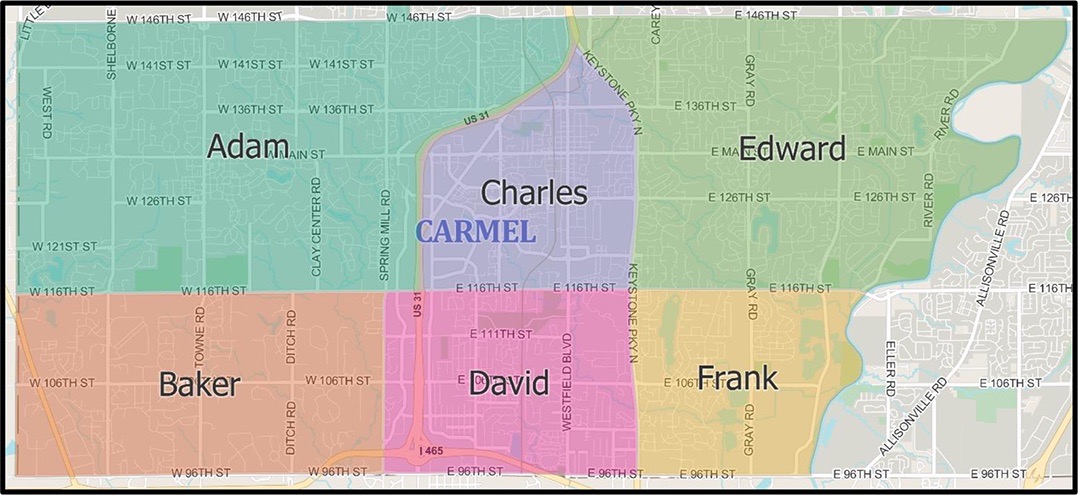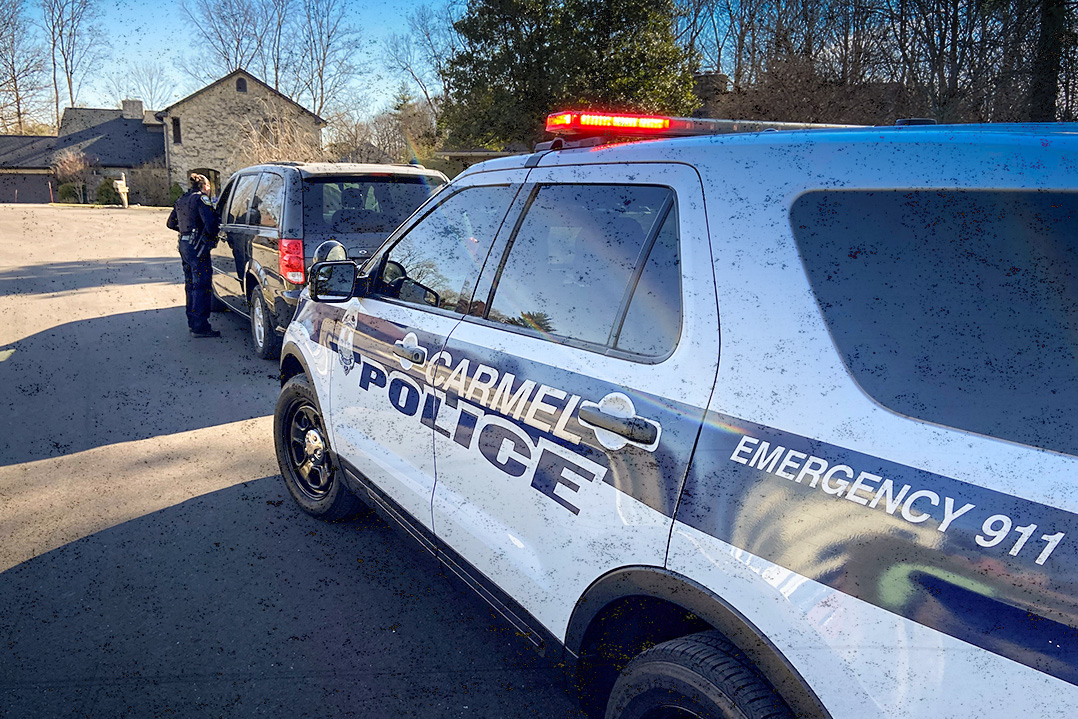A report commissioned by the Carmel Police Dept. in response to public claims that it targets Black drivers when making traffic stops concluded that such is not the case and that – to a slight degree – the opposite may be true.
According to the 203-page report compiled for $45,000 by North Carolina-based Dolan Consulting Group, researchers “found no evidence of a pattern or practice by members of the Carmel Police Dept. (targeting) persons of color for vehicle stops, citations, or arrests.”
CPD Chief Jim Barlow said the report supported what he always believed to be true, but he wanted an independent organization to take a closer look.
“The report shows that we’re not perfect, but we’re doing the right things for the right reasons,” Barlow said.
CPD publicly initiated the review after WISH-TV broadcast a story in 2019 that claimed Black drivers receive more than 33 percent of traffic tickets, according to state court documents, but make up only 2.5 percent of the population, according to U.S. Census data. The story echoed others in past years that accused CPD of racial discrimination and reinforced a perception held by many residents of Carmel and surrounding communities.
The report states that the methodologies used by the TV station, which Barlow described as “lazy math,” did not accurately reflect the demographics of Carmel drivers. The Dolan Consulting Group, which provides training and other support services for police and public safety officers nationwide, analyzed data gathered on 19,349 vehicle stops, 24,872 citations and 1,351 criminal arrests that occurred between July 1, 2020, and June 30, 2021, to build its report.
Researchers reviewed 2,845 vehicle crashes in Carmel, a type of incident not instigated by police or affected by race, to determine the demographics of drivers on Carmel roads. The study found that two-thirds of drivers in Carmel are not Carmel residents, meaning census data isn’t a valid benchmark to compare against demographics of those pulled over, and that 12.5 percent of Carmel drivers are Black.
The report concluded that “it proved impossible” for researchers to separate traffic-only stops from criminal investigative stops, so researchers used demographics of crash-involved drivers and demographics of the criminal population – determined by 2,236 criminal suspect descriptions from witnesses or victims of crime – as benchmark boundaries “with the assumption that the true (unknown) benchmark” for a mixed sample of traffic-only and criminal investigative stops would rest somewhere in between. Witnesses and victims reported suspects as Black in nearly 35 percent of cases reviewed.
The study also compared vehicle stops made during daylight hours, when it was easier for officers to determine the driver’s race, with those made during hours of darkness. Researchers concluded that Black drivers were “significantly less likely” to be stopped during daylight hours than expected, and during darkness the proportion of Black drivers stopped increased by 4 to 12.1 percent, depending on the patrol district. The report found “evidence to suggest a small degree of hesitancy on the part of officers to stop African-American males.”
Barlow said that officers don’t want to be seen as being discriminatory, which may have led to the discrepancy.
“Officers are frustrated, and they get tired of being called a racist,” he said. “I think it’s a natural tendency to think, ‘Oh no, if I stop another African American, then does it look like I’m a racist?’ I would assume it’s a natural tendency for all officers, even our officers of color.”
Deputy Chief Brady Myers agreed.
“Police officers are not different than most humans. Most of us avoid conflict where we can,” he said. “If there’s an opportunity to avoid some level of discomfort, some level of being painted with a broad brush based on a narrative that’s out there right now, I can see how our officers would respond to that by making less traffic stops.”
Although the report found that CPD did not discriminate against most demographic groups, it found evidence that female drivers were disproportionately more likely to be stopped during daylight hours in five of the city’s six patrol districts. After being stopped, however, females either were shown more leniency or treated equally to male drivers in receiving citations.
Barlow said he hasn’t done additional research into why females are pulled over more during daylight hours, but he said it may be because there may be more mothers out with children during the day than at other times. The report, however, states that only one of the city’s six districts revealed a statistically significant difference in female driving patterns from daylight to darkness.
As for the finding that females receive citations less often than males, Barlow said, anecdotally, in his experience, females are less likely to drive dangerously than their male counterparts, which could lead to the disparity.
Communities Allied for Racial Equality, a Hamilton County-based organization that advocates for police accountability and other social issues, released a statement thanking CPD for its “diligence and commitment to the Carmel community,” including by examining its actions through the report.
“CPD’s steps towards clear communication, transparency, and accountability are greatly appreciated concerning the report analyzing racial bias in traffic stops. A report such as this invokes the replacement of assumptions with facts, which is a positive step in the right direction for all parties involved,” the statement reads. “We would like to see a continuation of these studies and monitoring of data to ensure accuracy and transparency moving forward. Non-biased third parties conducting these types of studies, without officers knowing they are happening, ensures a greater understanding of the patterns of CPD.”
Barlow said he doesn’t expect CPD to make any major changes as a result of the report, but he said he hopes it will help shift public perception about an issue that’s “always been a point of attack” since he joined the department nearly 40 years ago.
“We don’t want to sit here and call this a victory or anything. It gives us guidance,” Barlow said of the report’s conclusions. “This was a good tool to tell us where we’re at.”
CPD plans to post the full report to its website at carmel.in.gov/government/departments-services/police.
Beyond the benchmarks

The Dolan Consulting Group’s report examining the Carmel Police Dept.’s fairness in traffic stops, citations and arrests included some findings that fell outside benchmark boundaries. The report found:
- Female drivers were stopped more often than expected during daylight hours in Adam District (10 extra stops per month), Baker District (eight extra stops per month), Charles District (27 extra stops per month), David District (13 extra stops per month) and Frank District (10 extra stops per month)
- Female drivers received a citation for speeding less often than male drivers in Baker, Charles, David, Edward and Frank Districts and received citations less often than males for expired plates in Frank District
- Alaskan Native/American Indians were cited for speeding less often than whites in Adam and Charles Districts
- Black drivers were stopped less often than expected during daylight hours in Adam, Baker, Edward and Frank Districts
- Black drivers were cited for speeding more often than whites (1.5 citations per month) in Edward District
- Hispanic drivers were cited for speeding more often than whites (1.5 citations per month) in Charles District and cited less often than whites for expired plates in Adam, Charles and Edward Districts
- White drivers were stopped more often than expected during daylight hours in Adam District (7 extra stops per month), Edward District (20 extra stops per month) and Frank District (6 extra stops per month)
- White drivers were cited for speeding more often than Alaskan natives/American Indians in Adam District and cited more often for expired plates than Hispanics in Adam, Charles and Edward Districts



